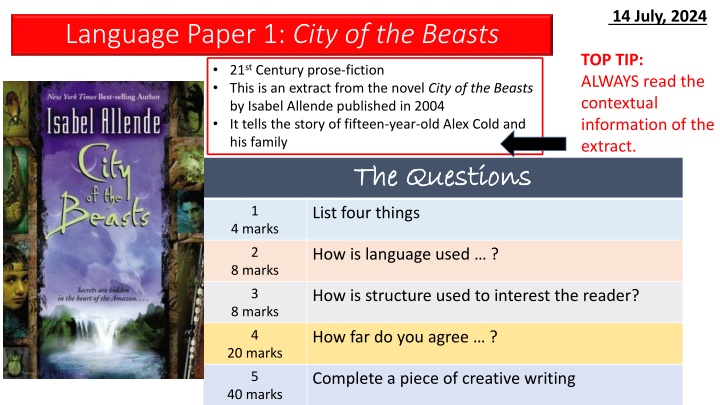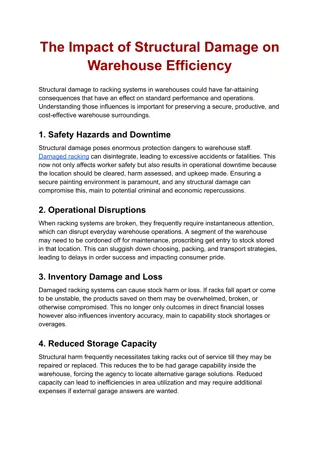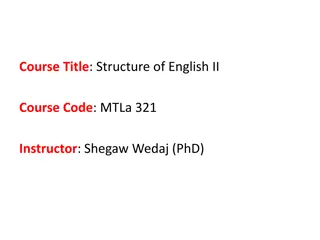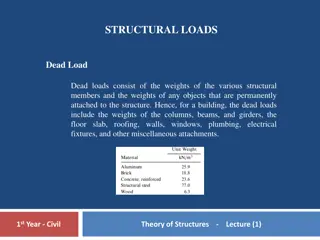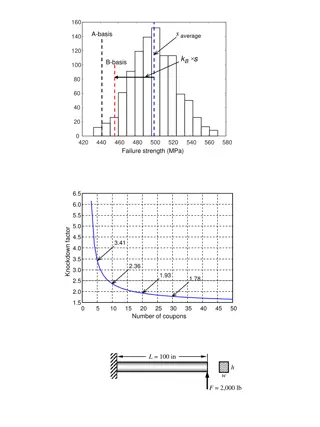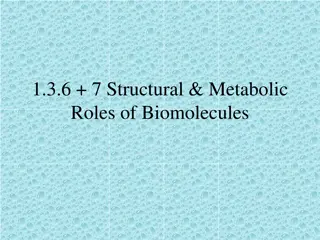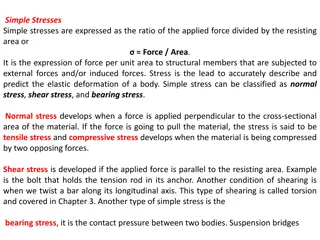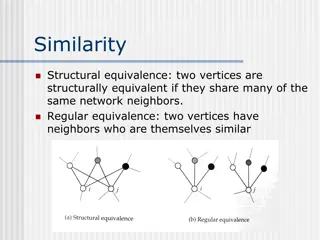Analyzing Structural Features in "City of the Beasts
Explore the use of structural features in the novel "City of the Beasts" by Isabel Allende through an in-depth analysis of the text's organization and how it captivates readers. Understand how the writer shifts focus, introduces key elements, and maintains reader engagement. This analysis aims to uncover the impact of structural choices on the narrative flow and reader experience.
Download Presentation

Please find below an Image/Link to download the presentation.
The content on the website is provided AS IS for your information and personal use only. It may not be sold, licensed, or shared on other websites without obtaining consent from the author.If you encounter any issues during the download, it is possible that the publisher has removed the file from their server.
You are allowed to download the files provided on this website for personal or commercial use, subject to the condition that they are used lawfully. All files are the property of their respective owners.
The content on the website is provided AS IS for your information and personal use only. It may not be sold, licensed, or shared on other websites without obtaining consent from the author.
E N D
Presentation Transcript
14 July, 2024 Language Paper 1: City of the Beasts TOP TIP: ALWAYS read the contextual information of the extract. 21st Century prose-fiction This is an extract from the novel City of the Beasts by Isabel Allende published in 2004 It tells the story of fifteen-year-old Alex Cold and his family The Questions The Questions List four things 1 4 marks 2 How is language used ? 8 marks 3 How is structure used to interest the reader? 8 marks 4 How far do you agree ? 20 marks 5 Complete a piece of creative writing 40 marks
Question Question 3 3 structure structure You now need to think about the whole of the source. This text is from the beginning of a short story. How has the writer structured the text to interest you as a reader? [8 marks] You could write about: what the writer focuses your attention on at the beginning of the source how and why the writer changes this focus as the source develops any other structural features that interest you
QUESTION 3 15 MINUTES, 8 marks Tests the ability to analyse how writers use structure to influence readers using relevant subject terminologies to support viewpoints How to succeed: WHAT: Describe what happens in this part of the text HOW: Use a key quote or make a reference to the text WHY: Explain why this is effective the IMPACT on the reader E.g. The writer begins with a description of a nightmare which woke Alex up quite suddenly. He is startled by his dream which creates a sudden and abrupt opening that is filled with a sense of unease. You will need to read the WHOLE text and analyse how it is ORGANISED. Write 3 paragraphs concentrate on the beginning, middle and end of the text; what the focus is at each stage and the effect of that. DON T WRITE: it draws the reader in OR it makes the reader curious as to what is going to happen next OR it makes the reader want to read on .
Question 3 Shows detailed understanding of structural features: Analyses the effects of the writer s choices of structural features Selects a range of examples Makes sophisticated and accurate use of subject terminology Level 4 Perceptive, detailed analysis 7-8 marks Shows clear understanding of structural features: Explains clearly the effects of the writer s choices of structural features Selects a range of relevant examples Makes clear and accurate use of subject terminology Level 3 Clear, relevant explanation 5-6 marks Shows some understanding of structural features: Attempts to comment on the effect of structural features Selects some appropriate examples Makes some use of subject terminology, mainly appropriately Level 2 Some understanding and comment 3-4 marks Shows simple awareness of structural features: Offers simple comment on the effect of structure Selects simple reference(s) Makes simple use of subject terminology, not always appropriately Level 1 Simple, limited comment 1-2 marks Level 0 No marks Nothing to reward
Shift from actions to thoughts Shift from people to places Shift from description to dialogue Structure New setting New character Shift in point of view Zoom in or out Shift in time
Section 1: Introduces the person, place and time quickly - Alexander Cold, awakes at dawn, startled by a nightmare The word startled creates a sudden and abrupt opening with a sense of unease Focus shifts to the nightmare when his mother was carried off by a black bird Alexander Cold awakened at dawn, startled by a nightmare. He had been dreaming that an enormous black bird had crashed against the window with a clatter of shattered glass, flown into the house, and carried off his mother. In the dream, he had watched helplessly as it clasped her clothing in its yellow claws, flew out the same broken window, and disappeared into a sky heavy with dark clouds. .
Section 2 Focus shifts to Alex s frightened reaction and the pounding in his chest There had been a lot of days like that since his mother got sick - first mention of his mother being ill, links to the nightmare at the beginning We are reminded of the first section when he watched helplessly as we know he can do nothing to protect his mother Focus shifts from Alex being alone to interacting with his family at breakfast - he snaps when Andrea says momma s going to die , the fear he experienced in his nightmare is manifested in his behaviour at the breakfast table What had awakened him was the noise from the storm: wind lashing the trees, rain on the rooftop, and thunder. He turned on the light with a sensation of being adrift in a boat, and pushed closer to the bulk of the large dog sleeping beside him. He pictured the roaring Pacific Ocean a few blocks from his house, spilling in furious waves against the rocks. He lay listening to the storm and thinking about the black bird and about his mother, waiting for the pounding in his chest to die down. He was still tangled in the images of his bad dream. Alexander looked at the clock: 6.30, time to get up. Outside, it was beginning to get light. He decided that this was going to be a terrible day, one of those days when it s best to stay in bed because everything is going to turn out bad. There had been a lot of days like that since his mother got sick; sometimes the air in the house felt heavy, like being at the bottom of the sea. At breakfast Alex was not in the mood to applaud his father s efforts at making pancakes. His father was not exactly a good cook; the only thing he knew how to do was pancakes, and they always turned out like rubber-tyre tortillas. His children didn t want to hurt his feelings, so they pretended to eat them, but any time he wasn t looking, they spit them out. When s Momma going to get better? Nicole asked, trying to spear a rubbery pancake with her fork. Shut up, Nicole, Alex replied. Momma s going to die, Andrea added Liar! She s not going to die! shrieked Nicole. You two are just kids. You don t know what you re talking about! Alex exclaimed. Here, girls. Quiet now. Momma is going to get better, his father interrupted, without much conviction.
Section 3: The father is struggling to look after the children - nothing in the fridge but orange juice and they are living on take-away food Alex has strong feelings about his mother which is evident in the long list of things that he misses about her His mother s affection has created an impact, but then he compares her to little more than a silent ghost showing how she has changed Left feeling how inadequate his father is, and how wonderful his mother is, or used to be Alex was angry with his father, his sisters, life in general even with his mother for getting sick. He rushed out of the kitchen, ready to leave without breakfast. Except for his father s pancakes and an occasional tuna-and-mayonnaise sandwich, no one in the family had cooked for months. There was nothing in the refrigerator but orange juice, milk and ice cream; at night they ordered in pizza or Chinese food. At first it was almost like a party, because each of them ate whenever and whatever they pleased, mainly sweets, but by now everyone missed the balanced diet of normal times. Alex had realised during those months how enormous their mother s presence had been and how painful her absence was now. He missed her easy laughter and her affection, even her discipline. She was stricter than his father, and sharper. It was impossible to fool her; she could see the unseeable. He missed her music, her flowers, the once-familiar fragrance of fresh-baked cookies, and the smell of paint. It used to be that his mother could work several hours in her studio, keep the house immaculate, and still welcome her children after school with cookies. Now she barely got out of bed to walk through the rooms with a confused air, as if she didn t recognise anything; she was too thin, and her sunken eyes were circled with shadows. Her canvases, which once were explosions of colour, sat forgotten on their easels, and her oil paints dried in their tubes. His mother seemed to have shrunk; she was little more than a silent ghost.
Alexander Cold awakened at dawn, startled by a nightmare. He had been dreaming that an enormous black bird had crashed against the window with a clatter of shattered glass, flown into the house, and carried off his mother. In the dream, he had watched helplessly as it clasped her clothing in its yellow claws, flew out the same broken window, and disappeared into a sky heavy with dark clouds. What had awakened him was the noise from the storm: wind lashing the trees, rain on the rooftop, and thunder. He turned on the light with a sensation of being adrift in a boat, and pushed closer to the bulk of the large dog sleeping beside him. He pictured the roaring Pacific Ocean a few blocks from his house, spilling in furious waves against the rocks. He lay listening to the storm and thinking about the black bird and about his mother, waiting for the pounding in his chest to die down. He was still tangled in the images of his bad dream. Alexander looked at the clock: 6.30, time to get up. Outside, it was beginning to get light. He decided that this was going to be a terrible day, one of those days when it s best to stay in bed because everything is going to turn out bad. There had been a lot of days like that since his mother got sick; sometimes the air in the house felt heavy, like being at the bottom of the sea. At breakfast Alex was not in the mood to applaud his father s efforts at making pancakes. His father was not exactly a good cook; the only thing he knew how to do was pancakes, and they always turned out like rubber-tyre tortillas. His children didn t want to hurt his feelings, so they pretended to eat them, but any time he wasn t looking, they spit them out. When s Momma going to get better? Nicole asked, trying to spear a rubbery pancake with her fork. Shut up, Nicole, Alex replied. Momma s going to die, Andrea added. Liar! She s not going to die! shrieked Nicole. You two are just kids. You don t know what you re talking about! Alex exclaimed. Here, girls. Quiet now. Momma is going to get better, his father interrupted, without much conviction. Alex was angry with his father, his sisters, life in general even his mother for getting sick. He rushed out of the kitchen, ready to leave without breakfast. Except for his father s pancakes and an occasional tuna-and-mayonnaise sandwich, no one in the family had cooked for months. There was nothing in the refrigerator but orange juice, milk and ice cream; at night they ordered in pizza or Chinese food. At first it was almost like a party, because each of them ate whenever and whatever they pleased, mainly sweets, but by now everyone missed the balanced diet of normal times. Alex had realised during those months how enormous their mother s presence had been and how painful her absence was now. He missed her easy laughter and her affection, even her discipline. She was stricter than his father, and sharper. It was impossible to fool her; she could see the unseeable. He missed her music, her flowers, the once-familiar fragrance of fresh-based cookies, and the smell of paint. It used to be that his mother could work several hours in her studio, keep the house immaculate, and still welcome her children after school with cookies. Now she barely got out of bed to walk through the rooms with a confused air, as if she didn t recognise anything; she was too thin, and her sunken eyes were circled with shadows. Her canvases, which once were explosions of colour, sat forgotten on their easels, and her oil paints dried in their tubes. His mother seemed to have shrunk; she was little more than a silent ghost. 03: You now need to think about the whole of the source. This text is from the beginning of a short story. How has the writer structured the text to interest you as a reader? [8 marks] You could write about: what the writer focuses your attention on at the beginning how and why the writer changes this focus as the source develops any other structural features that interest you.
Question 3 Shows detailed understanding of structural features: Analyses the effects of the writer s choices of structural features Selects a range of examples Makes sophisticated and accurate use of subject terminology Level 4 Perceptive, detailed analysis 7-8 marks Shows clear understanding of structural features: Explains clearly the effects of the writer s choices of structural features Selects a range of relevant examples Makes clear and accurate use of subject terminology Level 3 Clear, relevant explanation 5-6 marks Shows some understanding of structural features: Attempts to comment on the effect of structural features Selects some appropriate examples Makes some use of subject terminology, mainly appropriately Level 2 Some understanding and comment 3-4 marks Shows simple awareness of structural features: Offers simple comment on the effect of structure Selects simple reference(s) Makes simple use of subject terminology, not always appropriately Level 1 Simple, limited comment 1-2 marks Level 0 No marks Nothing to reward
